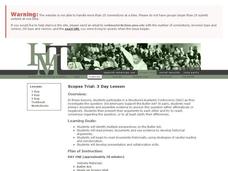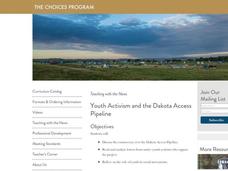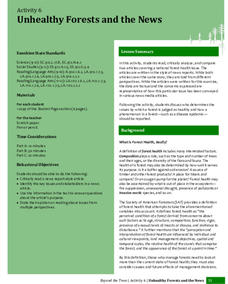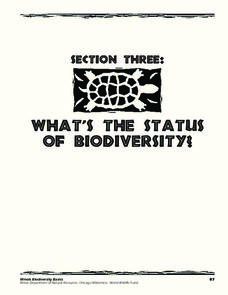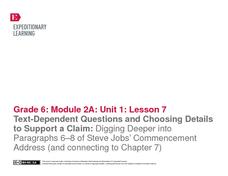Historical Thinking Matters
Scopes Trial: 3 Day Lesson
Was the Scopes trial more complicated than a simple debate between evolutionists and creationists? As part of a structured academic controversy (SAC) activity, pupils consider multiple perspectives of the Butler Act and engage in close...
Brown University
Youth Activism and the Dakota Access Pipeline
Do young people have a role in social movements? Should they? The involvement of young people in the Dakota Access Pipeline is the focus of a resource that asks class members to examine letters written by native youths who oppose the...
Novelinks
Zach’s Lie: The K-W-H-L Strategy
The attached resource is no lie! The K-W-H-L activity, which is fourth in a series of seven, serves as a pre- and post-assessment. First, pupils brainstorm what they know about a specific topic, then they list what they want to know, how...
University of Florida
Unhealthy Forests and the News
Everyone knows a tree makes a sound when it falls, but what do we know about dying trees? Class members learn background information about Laurel wilt disease from a teacher-led presentation. Team members work with partners to read and...
Illinois Department of Natural Resources
Section Three: What's the Status of Biodiversity?
Biodiversity is essential for every habitat, but many species are at risk due to pollution and other factors. Explore several different species native to Illinois in a gallery walk with posters that learners have created after research...
Newseum
E.S.C.A.P.E. Junk News
Fair, balanced, and reputable information? There's an acronym for that! Scholars learn the E.S.C.A.P.E. method for evaluating news sources. Then, pupils work in small groups to read and analyze a news story and discuss the activity to...
Curated OER
The O Zone-Code Read Alert
What are the effects of an air quality alert? Expert groups receive one component of air quality information resources to study. Pupils then jigsaw into new groups and share their knowledge. Finally, they draft a statement of what they...
Curated OER
Abigail’s War: The American Revolution through the Eyes of Abigail Adams
Four lessons, performed over four weeks, pay special attention to Abigail Adams. Fifth graders analyze primary and secondary sources, read texts, discuss and write about Adams' experience during the Revolutionary War—the Battle of Bunker...
University of California
Impact of the California Missions on Native Americans
While the Spanish claimed to bring civilization to California indigenous peoples, in reality, they also brought violence and forced assimilation to European values. Primary sources, such as the reports of Catholic priests and Europeans...
Center for History Education
Who Fired the Shot Heard Round the World?
Take a closer look. Young academics become detectives in an engaging lesson plan on the American Revolution. Scholars work in groups to analyze documents to uncover whether the American colonists or British soldiers fired the first shot...
Stanford University
Declaration of Independence
Scholars work in pairs to decide whether leaders wrote the Declaration of Independence for the rich and powerful or for every man. To draw their conclusion, pairs read excerpts from two historians and complete a graphic organizer citing...
Curated OER
Lights, Sounds, Fabrics and Designs: Careers in the World of Design
High schoolers investigate the broad range of jobs that can be found in the world of design. Students explore sound design, language architecture, etc. High schoolers design a resource book and post it on a website for others to share.
EngageNY
Text-Dependent Questions and Choosing Details to Support a Claim: Digging Deeper into Paragraphs 6–8 of Steve Jobs’ Commencement Address (and connecting to Chapter 7)
Readers learn how to choose specific details drawn from a primary source (Steve Jobs' 2005 Stanford University commencement address) to support an analysis of informative text.
Stanford University
Battle of the Somme
The Battle of the Somme was a conflict that raged on for months. Academics view a presentation and read text excerpts from newspaper articles to understand the events that turned the battle into a long conflict. The presentation also...
Historical Thinking Matters
Spanish-American War: 3 Day Lesson
Why did the United States choose to invade Cuba in 1898? As part of a 3-day activity, your young historians will first develop working hypotheses to answer this question, then work with a variety of historical primary source documents...
Historical Thinking Matters
Spanish-American War: 1 Day Lesson
After analyzing newspaper articles portraying different perspectives of the explosion of the Battleship USS Maine, your young historians will take a stand on which position is the most believable in both discussion and writing.
Curated OER
Rights and the Wyandotte Constitution
Every state uses a set of rights to establish laws and regulations. Explore the Wyandotte Constitution as it was written in 1859 and compare it with how rights in Kansas have changed, especially those that pertain to gender and race. A...
Curated OER
Energy Solutions; A Brochure
By creating an energy brochure, teams of science learners inform others about the advantages of using alternative energy sources. An instructions page for your class and a grading rubric are provided. The lesson focuses on photovoltaics,...
EngageNY
Individual Research
Seventh graders get the option of choosing their own text from a selection to read and gather more information as part of their research. Learners discuss the difference in reading for research and reading for pleasure. They also begin...
Curated OER
Solar Kit Lesson #8 - Positioning Solar Panels II: Explorations with Stationary Panels
This lesson is preparation-intensive, but well worth the investment. You will construct five or six portable testing stations with which lab groups will gather data on the best position for collecting sunlight with a solar panel. This is...
Curated OER
Bucket List Poetry
What is on your pupils' "Bucket Lists" - the list of things they want to do before they die? Their choices of activities for this list could be very revealing, and is a great source of inspiration for a personal poem. The lesson prompts...
Curated OER
Turning the Tide in the Pacific, 1941-1943
Students explore the overall strategies pursued by the Japanese and the Allies in the initial months of World War II. What each side hoped to accomplish what what actually happened forms the basis of a comparison made in this lesson.
Prestwick House
Writing Arguments in Response to Nonfiction
Emotional appeal or argument? That is the question. An informative activity helps your class recognize the difference between a logical argument and an emotional appeal and learn how to craft an argumentative response. Writers develop a...
Roy Rosenzweig Center for History and New Media
Immigrant Discrimination
For a class learning about Chinese and Irish immigration in America, here's a great starting lesson plan. It has your critical thinkers examining song lyrics, the Chinese Exclusion Act of 1882, and a political cartoon, and finally...


